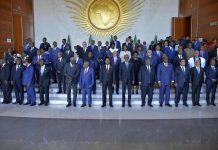Africa-Press – Lesotho. Concern about what Ukraine would do if it wins is already a major factor in deciding what kind of weapons the West gives to Ukraine
Ukraine wants more offensive weapons including modern tanks, self-propelled artillery and combat aircraft from NATO countries for its war with the Russian invaders, but it won’t be getting them from the United States in the latest tranche of American military aid.
There is a good reason for that. Germany and Slovakia are considering sending Leopard tanks and SP artillery to Kyiv in a few weeks’ time, but Joe Biden’s administration is still playing “Mother May I?”/ “Grandmother’s Footsteps” with Moscow.
He moves one cautious step up on the list of weapons he gives Ukraine, watches for the Russian response, then takes another step. It doesn’t matter at the moment, because this is the “rasputitsa”, the season of rain and mud in eastern Ukraine when off-road travel for heavy vehicles varies from difficult to impossible.
The Ukrainian forces won’t be attempting any grand offensives, and the Russians (who are planning exactly that) are very likely to get bogged down. The mud season will probably last for another six weeks.
Strict military logic would argue for postponing the Russian offensive in eastern Ukraine until then, but Putin probably can’t wait that long. The defeats and losses he suffered in his first attacks in northern Ukraine will gradually but inevitably leak out to the Russian public, so he needs a quick victory now.
He might get lucky, but there is unlikely to be a decisive Russian victory for two reasons. First, the Russians in the east will be attacking the best-trained, most experienced part of the Ukrainian army, well dug into defences that have grown every year since 2014.
That would not save the main Ukrainian army if other Russian forces can make a “pincer movement” behind it and cut it off, which is precisely what they will now try to do. The Russian troops now besieging Mariupol on the south coast will advance to the north as soon as it finally falls.
Other Russian troops are already attacking south from around Kharkiv, probably aiming to join up with them between Barvinkove and Pokrovsk and trap the main Ukrainian army.
If they succeed, Ukraine will have to seek a ceasefire in place, ceding all the lost territory to Russia, and Putin will have his victory. But first the Russians will have to advance about 150 kilometres on a single two-lane road that passes through villages ideal for ambushes every five or 10km.
And it’s the rasputitsa, so you can’t go around the villages. This is precisely the task that the Russian army spectacularly bungled in its attempt to seize Kyiv last month.
What are the odds that it will do better this time? And if it bogs down once again, what happens then?
Assume it’s late June, the ground is drying out, and the Russian troops are exhausted, over-extended and demoralised.
In Kyiv they will be thinking about taking back their lost territory — at least the territory they have lost since February, but some will also be thinking about recapturing the territories that Russia conquered in 2014.
The latter territories — Crimea and the eastern parts of Donetsk and Luhansk provinces — have little economic value, and most of the people who live there have been taught to hate Ukrainians.
If Russia loses again in the coming battles, there will be strong pressure in Kyiv to exploit the situation and take them back. That’s when the extra tanks and self-propelled artillery that the United States is not giving Ukraine now would come in very useful.
But it would also be the moment of utmost humiliation for Vladimir Putin (assuming that he is still in power), and it is always wiser to leave your defeated enemy an avenue of retreat.
Perhaps this entire article is an exercise in counting one’s chickens before they hatch, but you may be sure that they are also being counted in Washington and NATO right now.
Concern about what Ukraine would do if it wins is already a major factor in deciding what kinds of weapons, and how many of them, the West gives to Ukraine.
Nobody will admit out loud that Ukraine is being kept on a leash, but of course it is. Six weeks ago it had not occurred to anybody that doing that would be necessary, because they all expected Ukraine to lose.
You can sympathise with its desire to take revenge if it wins, but for the sake of peace in the future it cannot be allowed to do that. — Daily Pioneer
Gwynne Dyer’s new book is The Shortest History of War. The views expressed in this article are personal.
For More News And Analysis About Lesotho Follow Africa-Press






